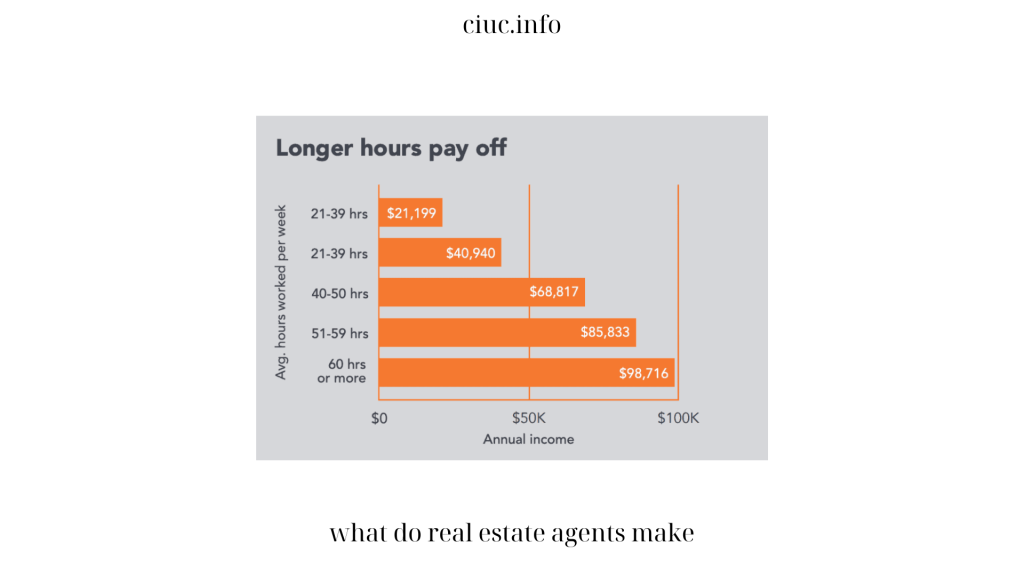The real estate industry is a dynamic and lucrative field that attracts individuals with a passion for helping clients buy, sell, and invest in properties. If you’re considering a career in real estate, it’s natural to wonder about the earning potential. In this article, Ciuc will delve into the topic of what do real estate agents make and provide insights into the factors that influence their earnings. By gaining a better understanding of the industry’s financial landscape, aspiring agents and curious individuals can make informed decisions about their career paths.
What Do Real Estate Agents Make: Understanding Earnings in the Industry

Commission-Based Compensation:
One of the defining characteristics of what do real estate agents make compensation is that it is primarily commission-based. Unlike salaried positions where income is fixed, real estate agents earn a percentage of the property’s sale price as their commission. This means that their earnings directly depend on the value and number of transactions they close. The commission structure typically ranges from 5% to 6% of the property’s sale price, but it can vary depending on factors such as location, market conditions, and individual agreements.
Factors Influencing Earnings:
Several factors come into play when determining how much real estate agents make. First and foremost is the agent’s level of experience and expertise. Seasoned agents with what do real estate agents make a vast network and a track record of successful deals are often able to command higher commissions. Additionally, geographical location plays a significant role. Agents operating in high-demand markets and luxury property sectors tend to earn more due to higher property values and larger transaction volumes.
The local market conditions also have a direct impact on what do real estate agents make an agent’s earnings. In a booming market with high demand and low inventory, agents may face increased competition, leading to potentially higher commissions. Conversely, in a slow market with limited buyer interest, agents may experience more challenges in closing deals and earning commissions. Economic factors, such as interest rates and job growth, can also influence the demand for properties and subsequently impact an agent’s earnings.
Brokerage Structure:
Real estate agents typically work under the umbrella of what do real estate agents make brokerage firm. These firms provide agents with support, resources, and training while taking a portion of the agent’s commission as a fee for their services. The commission split between the agent and the brokerage can vary depending on the specific arrangement. Some brokerages offer a higher split to experienced agents who bring in their own clients, while others provide more support but take a larger cut of the commission.

Independent agents who choose to operate without a what do real estate agents make may have more control over their earnings but also face the challenge of shouldering the costs associated with running their own businesses, such as marketing expenses and licensing fees. It’s important for agents to carefully evaluate the pros and cons of working with a brokerage versus working independently to determine the most suitable path for their career goals and financial aspirations.
Additional Income Streams:
While commissions from property what do real estate agents make form the primary source of income for real estate agents, there are other avenues through which they can supplement their earnings. Some agents diversify their income streams by offering additional services such as property management, real estate consulting, or hosting seminars and workshops. These ancillary services can provide agents with additional revenue sources and help them establish themselves as experts in their respective markets.
Career Development and Specializations:
Real estate agents have the opportunity to what do real estate agents make advance their careers and potentially increase their earnings by specializing in specific niches within the industry. By focusing on areas such as luxury properties, commercial real estate, or niche markets like vacation rentals or senior housing, agents can develop expertise and cater to a more specific clientele. Specializations often allow agents to command higher commissions due to the specialized knowledge and unique demands of these markets.
Market Fluctuations and Income Stability:
It’s important to note that what do real estate agents make income can be subject to fluctuations due to market conditions. In a thriving market, agents may experience periods of high activity and earn substantial commissions. However, during economic downturns or market corrections, the demand for properties may decline, resulting in decreased transaction volumes and lower earnings. Agents should be prepared for these fluctuations and maintain financial stability by budgeting and establishing a contingency fund to weather any lean periods.

The Role of Effort and Hustle:
While various external factors impact what do real estate agents make agent earnings, it’s crucial to emphasize the role of individual effort and hustle. Real estate is a highly competitive industry, and agents who actively prospect for clients, build strong relationships, and continuously enhance their skills are more likely to succeed and earn higher incomes. Successful agents invest time and resources in marketing, networking, and staying updated on industry trends to stay ahead of the competition.
Conclusion:
Understanding what real estate agents make involves considering what do real estate agents make several factors, including the commission-based structure, market conditions, location, experience, and brokerage arrangements. While there is potential for significant earnings in the industry, it is important to recognize that success and income can vary greatly depending on individual effort, market dynamics, and economic factors.
Aspiring real estate agents should carefully evaluate these factors and develop a strategic plan to maximize their earning potential. By staying informed, continuously learning, and delivering exceptional service to clients, real estate agents can build a rewarding andfulfilling career in the industry while enjoying the financial rewards that come with it.
